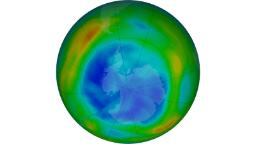The ozone layer is on track to recover within decades as harmful chemicals are phased out, scientists report | CNN

CNN
—
In rare good news for the planet, Earth’s ozone layer is on track to recover completely within decades, as ozone-depleting chemicals are phased out across the world, according to a new United Nations-backed assessment.
The ozone layer protects the planet from harmful ultraviolet rays. But since the late 1980s, scientists have sounded the alarm about a hole in this shield, caused by ozone-depleting substances including chlorofluorocarbons, dubbed CFCs, often found in refrigerators, aerosols and solvents.
International cooperation helped stem the damage. The use of CFCs has decreased 99% since the Montreal Protocol went into force in 1989, which began the phase-out of those and other ozone-harming chemicals, according to the assessment by a panel of experts published on Monday.
If global policies stay in place, the ozone layer is expected to recover to 1980 levels by 2040 for most of the world, the assessment found. For polar areas, the timeframe for recovery is longer: 2045 over the Arctic and 2066 over the Antarctic.
“Ozone action sets a precedent for climate action. Our success in phasing out ozone-eating chemicals shows us what can and must be done – as a matter of urgency – to transition away from fossil fuels, reduce greenhouse gases and so limit temperature increase,” said Secretary General for the World Meteorological Organization Petteri Taalas.
Ozone-depleting gases are also potent greenhouse gases, and without a ban the world could have seen additional warming of up to 1 degree Celsius, according to a 2021 study in the journal Nature. The planet has already warmed around 1.2 degrees since the industrial revolution, and scientists have warned that it should be limited to 1.5 degrees to prevent the worst consequences of the climate crisis. Warming beyond 1.5 degrees would dramatically increase the risk of extreme drought, wildfires, floods and food shortages, scientists have reported.
For the first time in this assessment, which is published every four years, scientists also looked at the prospect of solar geoengineering: the attempt to reduce global warming through measures such as spraying aerosols into the stratosphere to reflect sunlight out of the earth’s atmosphere.
They found stratospheric aerosol injection could help reduce climate warming but warned there may be unintended consequences. Deploying the technology “could also affect stratospheric temperatures, circulation and ozone production and destruction rates and transport,” the report, published every four years, found.
For all the latest world News Click Here

